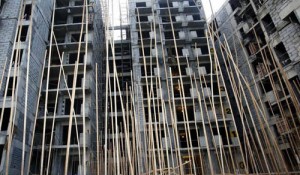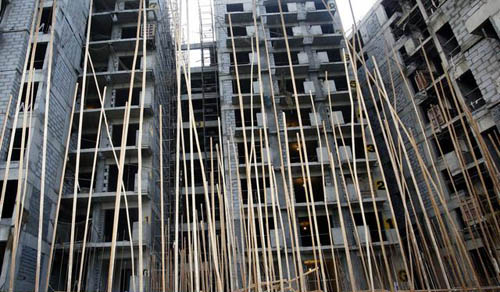By: Ravi Sinha
Track2Realty Exclusive
 Price rationalisation has always been a tricky issue in real estate business where demand and supply dynamics drive the market more than any other parameter. The fact that real estate is not a perishable commodity and mostly a business of deep pockets, holding of inventory many a time makes more sense than hard sell keeping in mind the pipeline visibility. This is sector’s best guarded secret and often countered with a number of defence, including rising input cost, government apathy, regulatory hurdles and dried funding options.
Price rationalisation has always been a tricky issue in real estate business where demand and supply dynamics drive the market more than any other parameter. The fact that real estate is not a perishable commodity and mostly a business of deep pockets, holding of inventory many a time makes more sense than hard sell keeping in mind the pipeline visibility. This is sector’s best guarded secret and often countered with a number of defence, including rising input cost, government apathy, regulatory hurdles and dried funding options.
However, at a time when the property prices are skyrocketing across the major micro markets of India and sales graph nose diving, the Finance Minister P Chidambram seems to have stirred the hornet’s nest by asking chiefs of government-owned banks to put pressure on real estate developers to lower property prices in order to get the economy moving. What has hurt the sentiments most is that in the same meeting with bank chiefs, the Finance Minister has even told bankers to impress upon builders the need to complete projects according to schedule and lower the prices of apartments that are ready for possession but not getting sold.
Banks have lent close to Rs 1.2 lakh crore to builders while their home loan portfolio came to Rs 2.5 lakh crore in the last week of March 2012, according to RBI data. As expected the realty body CREDAI has reacted sharply saying that instead of asking realtors to download unsold stock at discounted prices, the Union Finance Minister P Chidambaram should take immediate steps to boost to housing stock supply through special incentives to the affordable segment.
Commenting on reports suggesting that Chidambaram asked banks to pressurize developers to clear inventory and lower the prices to get the economy running, CREDAI National President Lalit Kumar Jain says it is welcome only because now at last the government has realized that real estate kick-starts the economic development. He, however, described the reported figure of unsold housing stock of 500,000 across the country as unrealistic.
“We ourselves have asked member developers to start selling even at rock bottom prices so that his capital is not stuck by sitting on unsold stock that too in a very high interest regime. On the one hand, banks are discouraged to lend to real estate developers while on the other cost of fund from non-banking sources is prohibitively high,” says Jain.
CREDAI has also volunteered to work with the Indian Banks Association on the proposed committee on housing sector which was mooted by the Finance Minister. The current size of the real estate industry is estimated to be about 180 Billion USD with a CAGR of 18-20%. For the past two years, however, liquidity in general and access to bank credits in particular has been restricted due to variety of risks. Therefore, just as any other sector of economy, the real estate sector has also found it difficult to tap bank resources, bank credits.
NAREDCO is more scathing in questioning as to why any developer will find business sense in holding inventory that has already been pre-sold whilst manufacturing is going on. Sunil Dahiya, Sr Vice President of NAREDCO says the lowering of sale price tariff has already taken place across the country, when developers have gone into re-positioning the same project with affordable tag price.
He suggests with ban on mining (stone/grit/cement limestone) and ban on ground water extraction, the government needs to facilitate the availability of basic raw material like stone, grit, sand and water for the industry to cater to the housing deficit that would otherwise see exponential cost override.
“First of all the developer community is only manufacturing the housing stock with inputs cost rising like cement/steel/labour. The collective index in last three years has seen CAGR increase of 55% as per government index and the land prices having risen by almost 200% as per government acquisition. The only factor diminishing is the profit margins of the developer community apart from debt pile up and servicing cost. The industry is facing above challenges, and hence, any inventory pile up are apprehensions that are not logical and hence, not practical,” says Dahiya.
Harmit Chawla, Managing Director of H Corp Realty blames both the government as well as the non-professional players in the sector for dragging the important component of housing into a logjam. He says government policy regards financing and regulation have led to the sector becoming more disorganised then organised and now irony is this unfounded belief that panacea for all problems ailing this sector lies in a regulator.
He, however, defends government rights as well to ask for accountability of money borrowed so that the situation does not reach a point of economic and political fallout, not much in the distant past we know what west has gone through.
“This is as wishful thinking as Jan Lokpal Bill eradicating corruption at every level. Builder are crying over input costs and high cost of finance, but no one wants an honest assessment of the money borrowed since 2005 as many of the project launched are yet to come up for completion. The problem to a large extent lies in the philosophy of the business that is followed in real estate. Can one expect that the input cost will remain static if the project gets delayed? Why should money be lent out to developers on basis of construction cost? Isn’t it true that cost of construction is to be funded from sale; minor cyclical imbalance on certain factors can be a valid reason for short term debt? Aren’t the banks themselves at fault to invest in a bad business model?” questions Chawla.
While there is a general belief that the Finance Minister will have to break investor-builder cartel to tame realty prices, realtors assert there needs to be some clarity in the collective consciousness, including the Finance Minister that it doesn’t make a business sense to hold the inventory in any given industry, and real estate is no exception. They question if the Finance Minister is really concerned about the housing shortage, why is there no coherence between the Finance Minister, Urban Development Minister, Minister of Housing and Poverty alleviation over the housing shortage. Had this been the case, some solutions would have been worked out and the realty sector been approached by the government to work collectively.
The sweeping statement to put pressure on the developers to clear inventory when there is no buyer in the market is like passing the buck. Can a sector be forced to do distress selling for no rhyme or reason?





